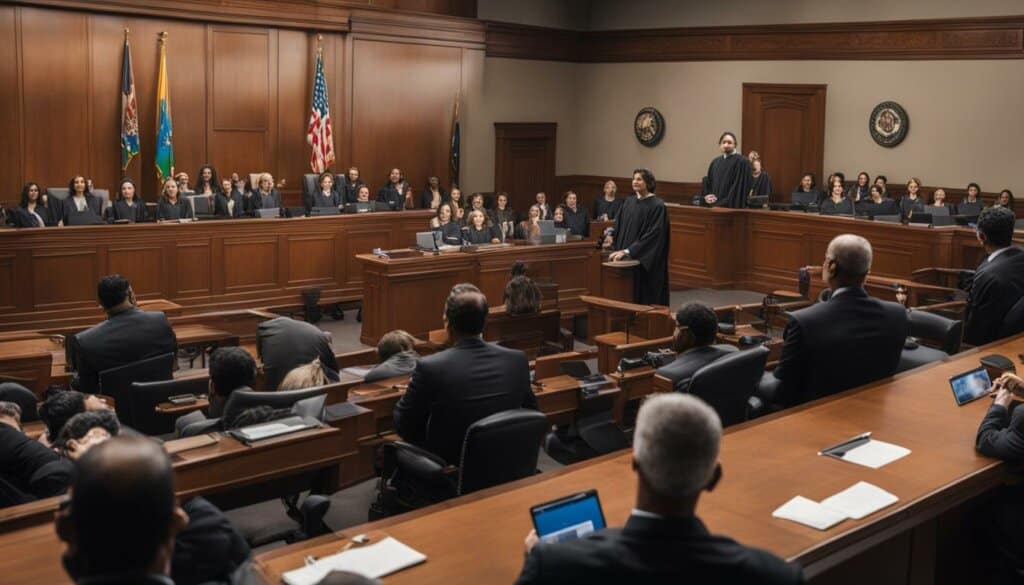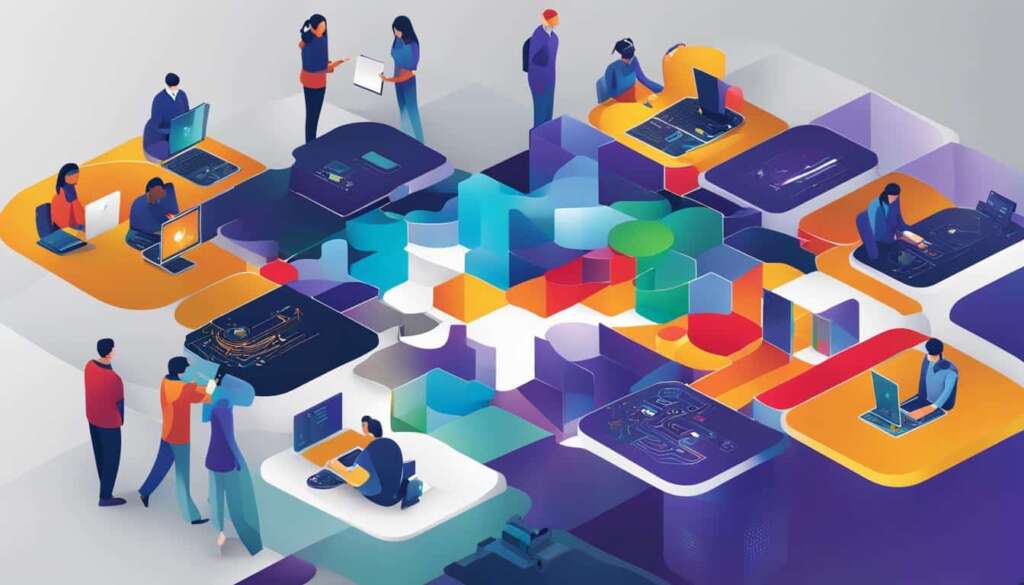Table of Contents
Microsoft and OpenAI’s recent collaboration has raised eyebrows among antitrust regulators, who have begun scrutinizing the partnership. The integration of Microsoft’s advanced cloud computing capabilities with OpenAI’s cutting-edge artificial intelligence technology has the potential to transform multiple industries – but any partnership that could result in reduced competition or other anticompetitive practices faces close examination by regulators.
This tie-up brings together two huge players in their respective industries, with Microsoft bringing its cloud computing and AI expertise and OpenAI contributing its deep learning technology and dedicated research team. While the combination of these two forces could produce significant advancements in AI, regulators remain concerned about the impact it could have on competition and innovation in the field.
Key Takeaways:
- Microsoft and OpenAI’s partnership has caught the attention of antitrust regulators
- The collaboration aims to bring together Microsoft’s cloud computing capabilities and OpenAI’s AI technology
- Antitrust authorities are concerned about potential anticompetitive behavior and its impact on innovation in the AI field
- The partnership could have significant implications for the broader tech industry
- The details of the legal challenges and regulatory response are still evolving
Understanding the Microsoft and OpenAI Partnership
Microsoft and OpenAI have joined forces to accelerate the development of artificial intelligence (AI) and create a more advanced and sustainable platform for the tech industry. The tie-up between these two tech giants involves a $1 billion investment from Microsoft, which will be used to develop OpenAI’s new AI technologies and enhance its research capabilities. OpenAI, in turn, will use Microsoft Azure as its preferred cloud technology platform, allowing it to scale its AI models seamlessly and efficiently.
This partnership is significant in the tech industry as it brings together two of the most prominent players in the AI space, where investment and innovation have been booming in recent years. The collaboration aims to create new technologies that have real-world applications and will benefit people, industry and society as a whole.
The Goals and Objectives of the Partnership
The partnership between Microsoft and OpenAI has several goals that aim to accelerate the development of AI and make it more accessible to people and businesses. These goals include:
- Developing new AI technologies that can help solve some of the world’s most pressing challenges, such as climate change, health, and education.
- Advancing the state of AI research by combining Microsoft’s expertise in machine learning and OpenAI’s research capabilities.
- Creating a more open and accessible AI platform that can benefit everyone, from individual developers to large enterprises.
- Ensuring that AI is developed in a way that is secure, transparent, and trustworthy, with a focus on ethical and responsible practices.
Potential Benefits of the Partnership
The Microsoft and OpenAI partnership has the potential to bring several benefits to the tech industry and society as a whole. These benefits include:
| Benefits | Description |
|---|---|
| Accelerated innovation | The collaboration between Microsoft and OpenAI can help accelerate the pace of AI innovation, leading to new breakthroughs and discoveries. |
| Increased accessibility | By creating a more open and accessible AI platform, Microsoft and OpenAI can democratize the use of AI and make it available to a wider range of people and businesses. |
| Improved research capabilities | With Microsoft’s expertise in machine learning and OpenAI’s research capabilities, the partnership can expand the frontiers of AI research and develop new technologies that can solve real-world problems. |
| Ethical and responsible AI | By focusing on ethical and responsible AI practices, the Microsoft and OpenAI partnership can help ensure that AI is developed in a way that is safe, transparent, and trustworthy. |
“The partnership between Microsoft and OpenAI is an exciting development in the AI space and has the potential to drive significant advancements in the field. By combining Microsoft’s expertise in machine learning with OpenAI’s research capabilities, we can create new technologies that have real-world applications and benefit people and society as a whole.” – Satya Nadella, CEO of Microsoft.
Antitrust Scrutiny and Legal Challenges
In recent weeks, the partnership between Microsoft and OpenAI has come under antitrust scrutiny from regulators and competitors. There are concerns that the collaboration between these two tech giants could lead to anti-competitive behavior, ultimately stifling innovation and harming consumer welfare.
The legal challenges faced by Microsoft and OpenAI are numerous. Firstly, there is the issue of market power. Both companies are dominant players in the tech industry, with extensive resources and capabilities at their disposal. The tie-up between the two could increase their collective market power, potentially creating barriers to entry for smaller players.
Furthermore, there are concerns around data privacy and security. OpenAI has access to vast amounts of data, which could be shared with Microsoft as part of the partnership. This has raised questions about the protection of user data and the potential for anti-competitive data practices.

The potential legal implications of the Microsoft and OpenAI partnership are significant. If found to be engaging in anti-competitive behavior, both companies could face fines and legal action. Additionally, the antitrust scrutiny could delay or even derail the partnership, impacting the goals and objectives of both Microsoft and OpenAI.
It’s important to note that Microsoft and OpenAI have responded to the concerns raised by regulators and competitors, stating that the partnership is focused on advancing AI technology and is not intended to harm competition. However, it remains to be seen how this will play out in the face of antitrust scrutiny and legal challenges.
Emerging Details and Response
As the partnership between Microsoft and OpenAI comes under antitrust scrutiny, new details are emerging regarding the potential impact on the tech industry.
One of the major concerns raised by regulators is the possibility of anti-competitive behavior resulting from this tie-up. Critics argue that this partnership could lead to a consolidation of power in the AI industry, with Microsoft and OpenAI dominating the market and stifling competition.
However, both Microsoft and OpenAI have defended their collaboration, stating that it will benefit the development and deployment of AI technology. In a joint statement, the companies outlined their shared vision for using AI to tackle some of the world’s biggest challenges, such as climate change and healthcare.
“We believe that the combination of OpenAI’s world-class research and Microsoft’s cutting-edge technology and global reach will enable us to accelerate the progress of AI and unlock new opportunities for people and businesses around the world,” the statement read.
Despite this, the antitrust scrutiny surrounding their partnership is unlikely to dissipate any time soon. Regulators will be closely monitoring the situation for signs of anti-competitive behavior, while competitors will be looking for ways to level the playing field.
It remains to be seen what the future holds for Microsoft and OpenAI, and how their partnership will shape the AI industry in the years to come. As more details emerge, it is clear that this is a story worth watching for anyone interested in the intersection of technology and antitrust law.

Potential Impact on the Tech Industry
The Microsoft and OpenAI tie-up and antitrust scrutiny it has attracted could have significant implications for the tech industry.
First and foremost, the partnership could lead to increased competition in the AI space, driving innovation and advancements in the field. With Microsoft’s cutting-edge technology and OpenAI’s research prowess, the collaboration could result in the development of new tools and applications that benefit consumers and businesses alike.
However, if antitrust concerns are not addressed, the tie-up could stifle competition and lead to monopolistic behavior, which could harm smaller companies and limit consumer choice. Regulators will be closely monitoring the situation to ensure that the partnership does not result in anti-competitive behavior.
Another possible impact is the potential for a ripple effect on other companies in the tech industry. If the Microsoft and OpenAI partnership is successful, other tech giants may seek similar collaborations with AI-focused companies, leading to a shift in the industry’s landscape.
AI Ethics and Consumer Welfare
Additionally, the Microsoft and OpenAI tie-up also raises important questions regarding AI ethics and consumer welfare. As AI becomes increasingly integrated into our daily lives, it is crucial to consider the potential impact on society, from job displacement to biases in decision-making.
The partnership must prioritize ethical considerations and ensure that their AI applications are developed with consumer welfare in mind. This includes addressing issues such as transparency, accountability, and data privacy. By promoting responsible AI development, the industry can build trust with consumers and foster long-term growth.
“It is not about making machines more human. It is about making machines more trustworthy.” – Satya Nadella, CEO of Microsoft
In conclusion, the Microsoft and OpenAI tie-up and antitrust scrutiny it has attracted could have far-reaching implications for the tech industry. While the partnership has the potential to drive innovation and competition, it must also address ethical considerations and avoid anti-competitive behavior. By doing so, the industry can build trust with consumers and continue to push the boundaries of AI development.
Conclusion
In conclusion, the Microsoft and OpenAI tie-up has attracted significant antitrust scrutiny from regulatory authorities and competitors alike. This collaboration aims to bring about immense advancements in the field of artificial intelligence, with potential benefits for the tech industry at large. However, the concerns raised by antitrust regulators regarding potential anti-competitive behavior cannot be ignored.
With the legal challenges that may arise as a result of this partnership, including the possible implications for competition and consumer welfare, it is important for Microsoft and OpenAI to engage in responsible conduct. The emerging details of this situation, including the response of these tech giants and regulatory authorities, should also be taken into account.
In the coming days, it will be interesting to see how this tie-up unfolds and the impact it has on the broader tech industry. As we continue to monitor the situation, we urge Microsoft and OpenAI to proceed with caution and in compliance with all antitrust regulations.
FAQ
What is the partnership between Microsoft and OpenAI?
The partnership between Microsoft and OpenAI is a collaboration aimed at advancing artificial intelligence technologies and developing new capabilities in the field.
What are the goals of this partnership?
The partnership aims to leverage Microsoft’s expertise in cloud computing and OpenAI’s research in artificial intelligence to accelerate innovation and drive the adoption of AI-based solutions.
Why has this partnership attracted antitrust scrutiny?
Antitrust regulators are scrutinizing the partnership to assess whether it could potentially lead to anti-competitive practices or harm competition in the technology industry.
What legal challenges may arise from this tie-up?
The partnership may face legal challenges related to antitrust laws, which prohibit anti-competitive behavior and the abuse of market dominance.
Are there any new developments regarding this partnership and the antitrust scrutiny?
The situation is evolving, and there may be emerging details and responses from both the companies involved and regulatory authorities. Stay updated for the latest developments.
How might this partnership impact the tech industry?
The partnership could have implications for competition, innovation, and consumer welfare in the tech industry. It may also influence the landscape and strategies of other companies in the sector.
In conclusion, what are the key takeaways from this Microsoft and OpenAI tie-up under antitrust scrutiny?
The partnership between Microsoft and OpenAI holds great potential for advancements in AI technology. However, it also faces antitrust scrutiny, which may lead to legal challenges and implications for the wider tech industry. Stay informed for further updates on this developing situation.













